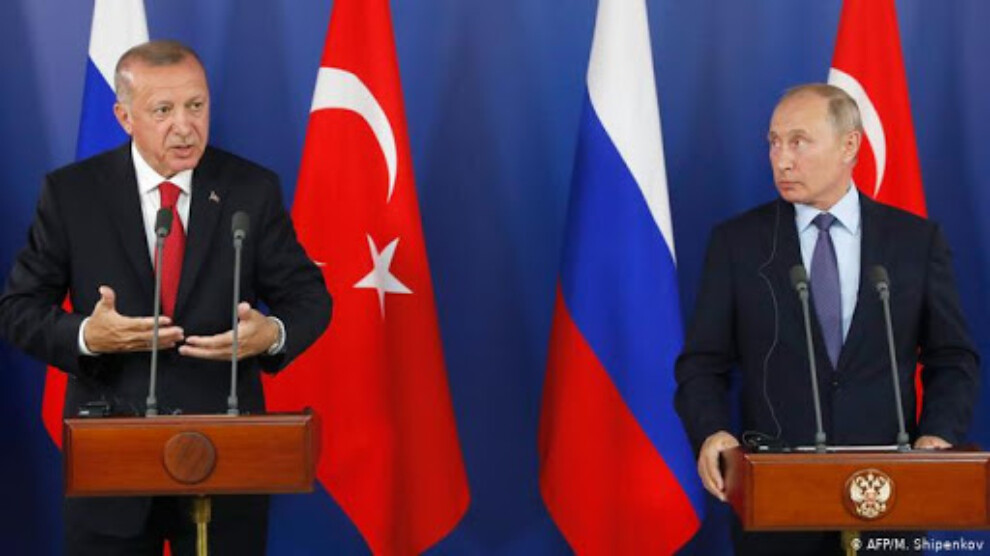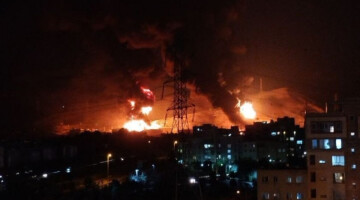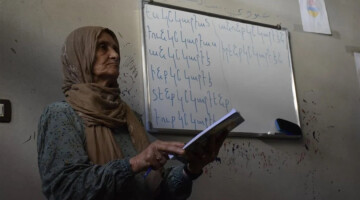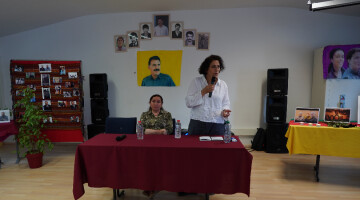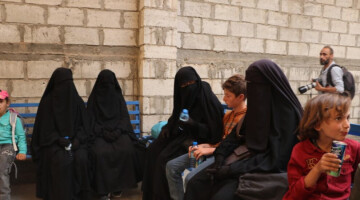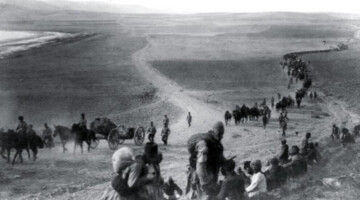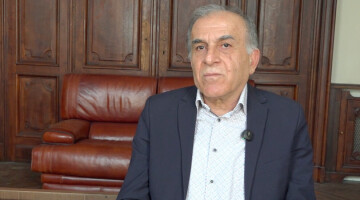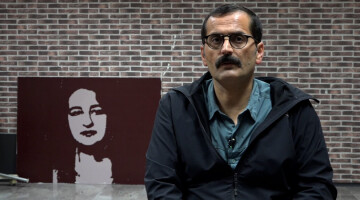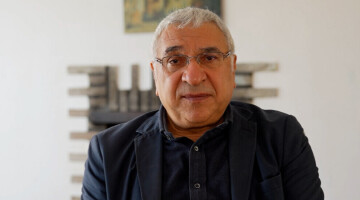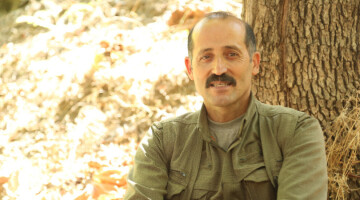On 11 and 12 July, the NATO summit will take place in Vilnius, Lithuania, in a confrontation with Russia. While the Western military alliance focuses on unity, member state Turkey acts between the power blocs Russia and NATO and tries to push through its own expansionist interests. Journalist Yusuf Karadaş, who writes for the left-wing newspaper Evrensel, analyses the foreign policy of the newly elected old Turkish government and its relationship with NATO and Russia in an interview with ANF.
Turkey is using the contradictions between the USA and Russia to strengthen its own expansionism. At the upcoming NATO summit, the US is expected to ask Turkey to approve Sweden's membership. How do you see the developments?
As you know, this debate was originally about the membership of Finland and Sweden. The Ukraine-Russia war has allowed countries that we thought might not apply for NATO membership to also decide to become NATO members because of the resulting security concerns and threat scenario. This was the planned policy of the USA anyway. In this context, Finland and Sweden applied for NATO membership. As is known, Finland's application was approved by Erdoğan and the Turkish parliament in March after Turkey's conditions were met. Of course, it must be said that Erdoğan's government tried to use Finland's and Sweden's membership applications as a means to gain its own advantages.
What did the Turkish government want to gain for itself? What was it all about?
Turkey tried to involve NATO in its war against the Kurds in Rojava and at least to get them and the USA to agree to an operation that it would carry out itself. When it did not achieve what it wanted, Turkey tried to negotiate with Finland and Sweden to have "terror" laws passed there and, above all, Kurds extradited to Turkey. After Finland, negotiations are now continuing with Sweden. Sweden has also passed a new terror law. Here, too, it is of course important to point out that the adoption of these laws by these states should not be seen merely as a concession to the Erdoğan regime.
Why?
The fact that these countries, which call themselves the cradle of democracy, have accepted terror laws as a result of such a deal should be seen as an expression of their own tendency towards increasingly reactionary policies. It is a politics that is prepared to use these laws against its own people. It is not just about negotiating with Erdoğan. It is about a reactionary attitude that undermines democratic achievements.
Furthermore, we must address the fact that the Erdoğan government, especially after the elections and in the context of the appointment of Mehmet Şimşek as Minister of Economy, is trying to adopt a more harmonious and acceptable position towards the West, the US and NATO.
With regard to the NATO issue, Biden's congratulatory phone call with Erdoğan, in particular, in which he expressed his demand for Turkish consent to Sweden's NATO accession, and the NATO Secretary General's participation in Erdoğan's ceremony, where he also met with Hakan Fidan [new foreign minister, former intelligence chief] and the new defence minister Yaşar Gürer, can be seen as the first steps of a new negotiation process with the Western powers.
And will this process go as desired?
Although the Erdoğan government will probably continue to negotiate here, it will have to accept Sweden's NATO membership in some way. A pillar of this negotiation process is also the sale of F-16 aircraft by the US to Turkey. Whether it will happen at the NATO summit or not, this negotiation process will bring a result as a result of the talks between the leaders, even though it may not be achieved until after the summit. Therefore, I think Erdoğan will use this step to renew his relations with the Western powers in a certain way. Of course, you can also see that Erdoğan is trying not to get into an open contradiction with Russia. This is also a background for Turkey's contradictions. It wants to show Russia that it opposes NATO and wants to maintain its relations with Russia.
Can this be defined as a policy of balance between the powers?
It cannot be called a policy of balance. It is about exploiting the contradiction between the power blocs as much as possible for their own interests. It is not a policy of balance, because Turkey also tries to exploit contradictions, but is forced to make more and more concessions depending on the situation. At some points, Turkey has been forced to take steps backwards, and these points are increasing. The most concrete example of this we see in Turkey's relations with Israel, the United Arab Emirates, Egypt and Saudi Arabia. Recently, Erdoğan openly declared these states to be coup plotters, financiers of the 15 July [2016 military coup attempt in Turkey] or murderers, but then he had to return to them in the course of a policy of concessions in the sense of normalising relations.
The Astana talks are a negotiation process between Syria, Russia, Turkey and Iran, with Russia at the centre. These talks are ongoing, and as far as the balance of power in Syria is concerned, this is a point that Russia has made a subject of negotiation in order to keep Turkey in a position where it can do as little as possible against Russia. The most important pillar of this agreement is directed against the Kurds in Syria. Russia knows that the Erdoğan government sees Kurdish achievements as a threat, considers violence as a means to solve the Kurdish question and therefore wants to continue its policy of aggression against Rojava. Russia is giving Erdoğan the opportunity to build up pressure on the Kurds in its own interest. This is because Russia itself wants to increase the pressure on them and force them to compromise with Assad and play the USA and Turkey off against each other in the field. For this reason, Russia turns a blind eye to attacks by Turkish armed drones, even if it does not open the way for Turkey to directly invade.
The intelligence chief, Hakan Fidan, was appointed foreign minister. Is this a sign of political change or does it represent continuity?
It is indeed necessary to discuss this in the context of the time when Hakan Fidan became head of MIT. Because in 2007, when MIT constituted a so-called "proactive foreign policy", Hakan Fidan was at the centre of this process, first as deputy undersecretary of MIT and then as director of the intelligence agency. This proactive foreign policy was put into practice everywhere Turkey struggled for hegemony and the distribution of resources - in the Middle East, the Eastern Mediterranean, the Caucasus, the Black Sea and the Balkans. The MIT took an active role in this by being placed in a position as an interventionist force participating in operations in the interests of the ruling classes in Turkey. When this policy was established, Hakan Fidan was first deputy and then chief. Therefore, Hakan Fidan is a symbol of the policy of that time. This is important here. Erdoğan refers to him as his "secre". The fact that he has now become foreign minister and Erdoğan's deputy in charge of foreign policy is a sign that, as when he came to head MIT, he will continue this policy in this area. But although this is meant to sell a success story, a large part of the operations carried out during Fidan's tenure have in fact failed.
What are they?
These range from the sending of the Mavi Marmara ship to Gaza to the intervention policy in Syria and Iraq. The fact that the MIT was not able to keep the talks secret during the negotiation process of the Kurdish question is also no credit. What is most often presented as a success is the use of jihadist organisations and armed drones to balance Libya. On the other hand, the positioning on the side of Azerbaijan in the Nagorno-Karabakh war in the Armenian-Azerbaijani conflict can also be considered. This actually served Russia's interests. By suppressing Armenia, Russia's control was restored. By pushing back General Haftar in Libya, the interests of the USA were served. This intervention enabled the US and the Western powers to get the United Nations active there again. So, actually, this success story can only be read as an apparent profit from contradictions. Actually, it only served the interests of the imperialists. Although the Erdoğan government is trying to present itself as a game changer with these interventions, the real game changers and those who have been able to use these operations for their policies are others.
Therefore, I think that this policy will continue to be based on using contradictions for its own expansionist ambitions whenever the government finds the opportunity, on the one hand, and making concessions whenever it is forced to do so, on the other. In this respect, there will be no particular change with Fidan as foreign minister. However, this policy is neither anti-imperialist, as it is propagated, nor in the interests of the peoples of Turkey. On the contrary, it is a policy that plunges Turkey into more violence and crises, in line with the interests of the ruling classes in Turkey.
After all, the government campaigned with war, threats of invasion and armament. What remains of this?
Although the government is trying to sell a success story, as Erdoğan has regained both the parliamentary majority and the presidency, it is obvious that this is once again a debacle comparable to the 2019 local elections, in which the AKP lost several major cities. Therefore, we can already say that the government will continue the policy of tension, especially in view of the upcoming local elections. The new legislative period will be very difficult for the people, especially because of Mehmet Şimşek's economic policies. The working class will face more poverty, lower wages and even more unemployment. This also points to a time when violence and oppression will continue to increase. If we look at the world political situation, we see that major powers that are supposed to be against such regimes are cooperating with these regimes. The West is criticising the Erdoğan government not because it is repressive, but because it is not cooperating sufficiently. Because, as I said at the beginning, the question must be raised to what extent the West is realising its own democratic principles today. Reactionary politics are on the rise throughout Europe and the USA. The bourgeoisie has mobilised these forces. For them, the most important question is how compatible Erdoğan is with them. This development will shape the situation in the world in the period ahead. The struggle between these forces will inevitably have an impact on Erdoğan's policies in Syria, the Black Sea and the Eastern Mediterranean. It may soon be possible to analyse this in more detail.
Perhaps the NATO summit will offer signs of how the new phase will be shaped. The extent to which the announced steps towards the normalisation process with Syria are taken or not will be one of the indicators. But what we can already tell is that the coming phase will not be an easy time for the Erdoğan government and for the forces fighting for hegemony through the Ukrainian-Russian war. But this is also true for us and for the forces of labour and democracy. A period of increasing repression against the Kurdish people, the democratic forces in Turkey and the working class is coming. This is to keep them under control. At the same time, of course, these challenges will bring new opportunities for struggle. Therefore, I think that the attitude of the working people, our peoples and the political forces and alliances will be crucial in finding an answer to the question of what the future of the country and the region will be.

